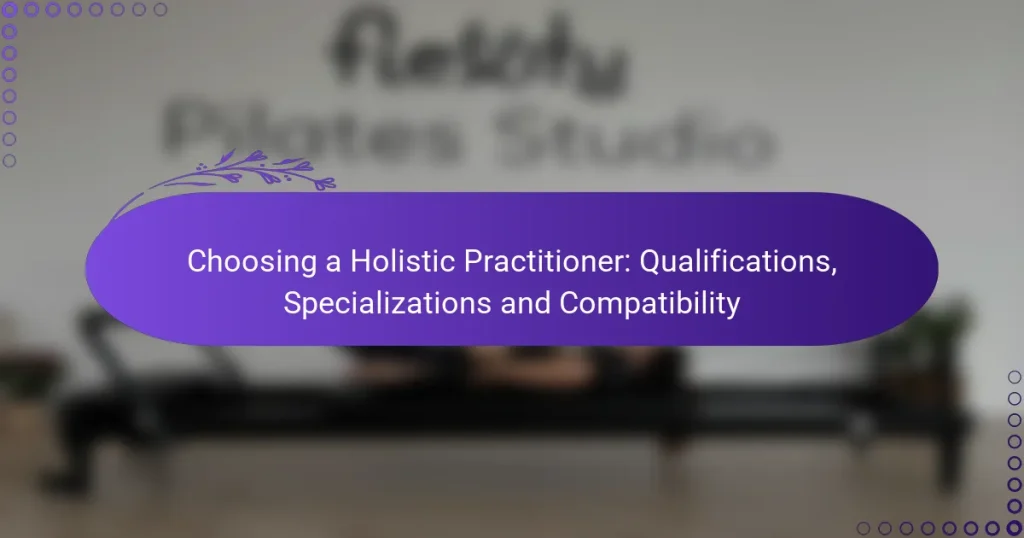Choosing a holistic practitioner requires careful consideration of their qualifications, specializations, and your personal compatibility. By evaluating their education and certifications, you can ensure they are equipped to provide safe and effective treatments tailored to your needs. Additionally, understanding their areas of expertise, such as nutrition or acupuncture, can help you find the right fit for your holistic health journey.

How to choose a holistic practitioner in Los Angeles?
Choosing a holistic practitioner in Los Angeles involves evaluating their qualifications, specializations, and your personal compatibility with them. This ensures you receive the most suitable care tailored to your needs.
Evaluate qualifications and certifications
Start by checking the practitioner’s educational background and certifications. In California, holistic practitioners may hold licenses in fields such as acupuncture, massage therapy, or naturopathy, which often require specific training and state certification.
Look for practitioners who are members of reputable professional organizations, as these memberships often indicate adherence to ethical standards and ongoing education. Examples include the American Association of Naturopathic Physicians or the National Certification Commission for Acupuncture and Oriental Medicine.
Assess specializations and treatment modalities
Different holistic practitioners may specialize in various areas, such as herbal medicine, energy healing, or nutritional counseling. Identify what specific issues you want to address, such as stress management or chronic pain, and seek practitioners who focus on those areas.
Consider the treatment modalities they use. Some may offer a combination of therapies, while others may focus on a single approach. Researching these methods can help you understand what to expect and how they align with your personal health philosophy.
Consider practitioner compatibility
Compatibility with your holistic practitioner is crucial for effective treatment. Schedule an initial consultation to gauge your comfort level with their communication style and approach to care. Trust and rapport can significantly impact the healing process.
Reflect on your values and preferences. For instance, some practitioners may emphasize a more traditional approach, while others may adopt a more intuitive or spiritual perspective. Finding someone whose philosophy resonates with you can enhance your overall experience.
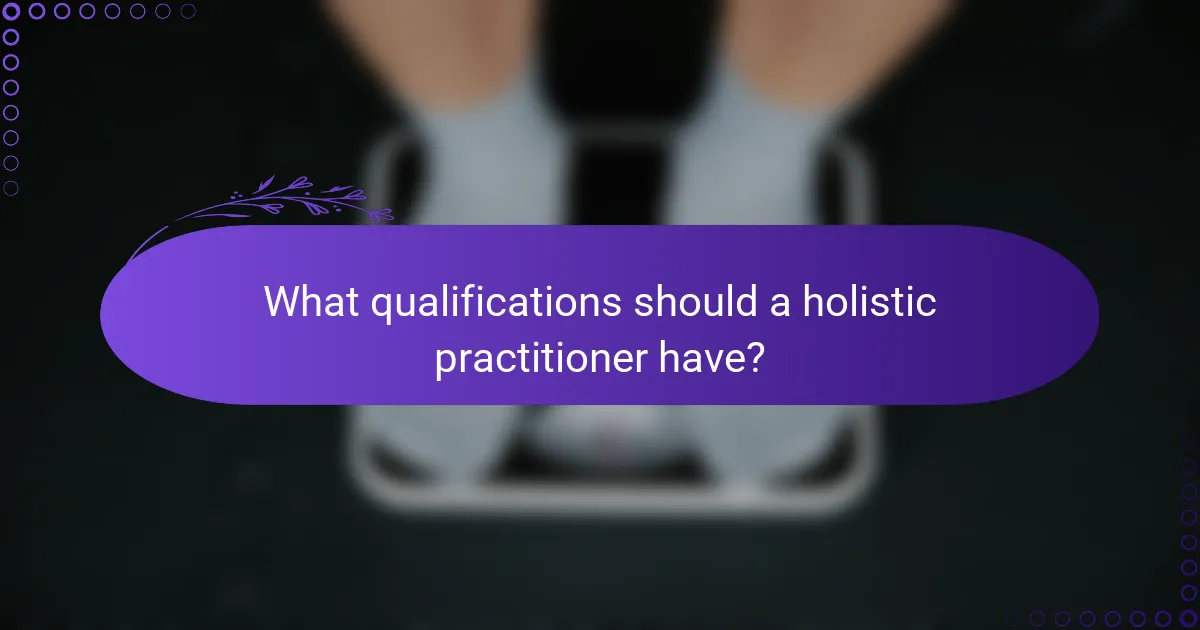
What qualifications should a holistic practitioner have?
A holistic practitioner should possess relevant education and certifications that demonstrate their expertise in alternative health practices. It’s essential to verify their qualifications to ensure they are equipped to provide safe and effective treatments.
Relevant degrees and certifications
Holistic practitioners often hold degrees in fields such as naturopathy, acupuncture, or herbal medicine. Certifications from recognized organizations, like the National Certification Commission for Acupuncture and Oriental Medicine (NCCAOM) or the American Association of Drugless Practitioners (AADP), can further validate their skills.
When selecting a practitioner, check their educational background and any specialized training they have undergone. This can include coursework in nutrition, energy healing, or mind-body therapies, which are crucial for a comprehensive approach to health.
Continuing education requirements
Many holistic practitioners are required to complete continuing education to maintain their licenses or certifications. This ensures they stay updated on the latest practices, research, and techniques in holistic health.
Look for practitioners who actively engage in ongoing education, as this reflects their commitment to professional growth. Some may attend workshops, seminars, or online courses regularly, which can enhance their knowledge and skills in specific areas of holistic care.
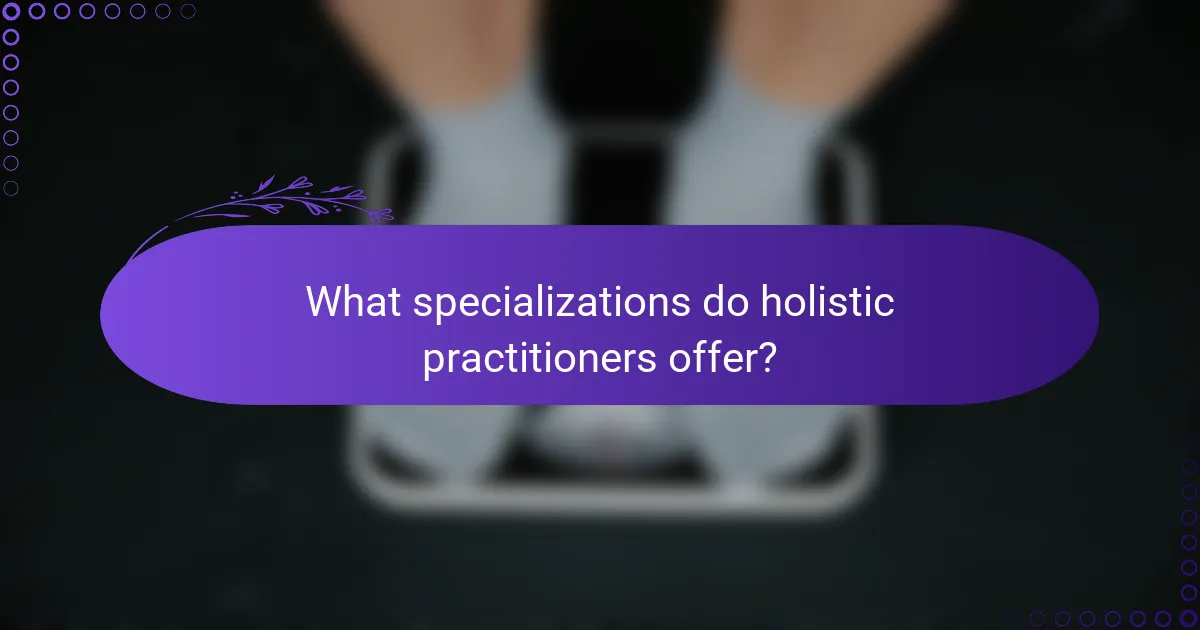
What specializations do holistic practitioners offer?
Holistic practitioners provide a range of specializations that focus on treating the whole person rather than just symptoms. Common areas include nutrition, acupuncture, and mindfulness, each addressing different aspects of health and well-being.
Nutrition and dietary counseling
Nutrition and dietary counseling involves personalized dietary plans aimed at improving health and preventing illness. Practitioners assess individual needs based on factors like age, lifestyle, and health conditions.
When seeking a nutrition specialist, consider their credentials, such as certifications in nutrition or dietetics. Look for practitioners who can provide practical meal plans and advice tailored to your preferences and health goals.
Acupuncture and traditional Chinese medicine
Acupuncture and traditional Chinese medicine (TCM) focus on balancing the body’s energy, or Qi, through various techniques. Acupuncture involves inserting fine needles into specific points to alleviate pain and promote healing.
When choosing an acupuncturist, verify their training and licensing, as regulations vary by region. Sessions typically last between 30 to 90 minutes, and many patients report feeling relaxed and rejuvenated afterward.
Mindfulness and stress management
Mindfulness and stress management techniques aim to enhance mental well-being through practices like meditation, breathing exercises, and yoga. These methods help individuals manage stress, improve focus, and foster emotional resilience.
Look for practitioners who offer structured programs or workshops that fit your schedule. Regular practice can lead to significant improvements in stress levels, often within a few weeks. Consider starting with short daily sessions and gradually increasing duration as you become more comfortable.
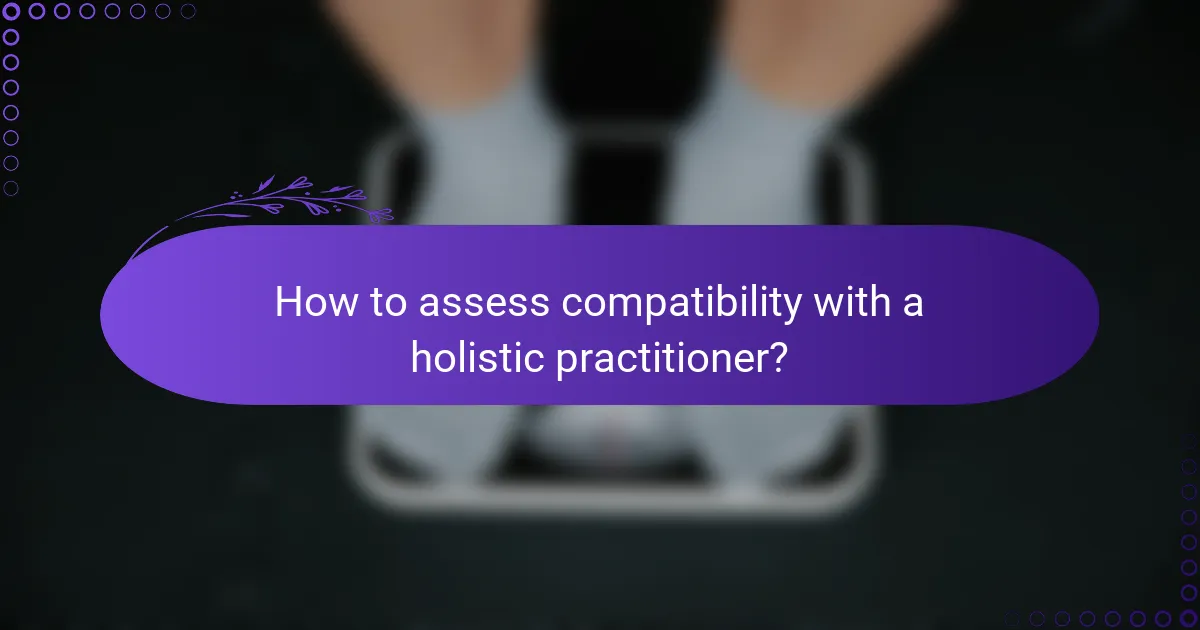
How to assess compatibility with a holistic practitioner?
Assessing compatibility with a holistic practitioner involves evaluating their approach, philosophy, and how well they align with your personal health goals. This ensures a productive and supportive relationship that enhances your overall well-being.
Initial consultation insights
The initial consultation is a crucial opportunity to gauge compatibility. During this meeting, practitioners typically discuss their methods, treatment philosophies, and how they can address your specific needs. Pay attention to how they listen to your concerns and whether they provide clear explanations of their practices.
Consider asking about their experience with your particular health issues or goals. A practitioner who has worked with similar cases may offer insights that resonate with your situation, enhancing your confidence in their abilities.
Communication style and rapport
Effective communication is vital for a successful practitioner-client relationship. Observe how the practitioner communicates; do they use jargon, or do they explain concepts in an understandable way? A good fit will involve a practitioner who can articulate their ideas clearly and is willing to answer your questions.
Rapport plays a significant role in your comfort level. Trust your instincts—if you feel at ease and understood, it’s a positive sign. Conversely, if you feel dismissed or uncomfortable, it may be worth exploring other options to find someone who better matches your communication style and emotional needs.

What are the costs associated with holistic practices in California?
The costs of holistic practices in California can vary widely based on the type of service, the practitioner’s experience, and the location. Generally, clients can expect to pay anywhere from $50 to $200 per session, depending on these factors.
Average session fees
In California, average session fees for holistic practitioners typically range from $75 to $150. For instance, acupuncture sessions may cost around $80 to $120, while massage therapy can range from $70 to $150. It’s advisable to inquire about package deals or sliding scale options, which some practitioners offer.
Keep in mind that initial consultations might be priced higher, sometimes reaching up to $200, as they often include comprehensive assessments. Always confirm the fee structure before booking your appointment.
Insurance coverage options
Insurance coverage for holistic practices in California varies significantly by provider and plan. Some health insurance plans may cover specific services like acupuncture or chiropractic care, but coverage is not universal. It’s essential to check your policy details or contact your insurance provider to understand what is included.
Additionally, some practitioners may offer payment plans or discounts for clients without insurance. Always ask about these options during your initial consultation to avoid unexpected costs.
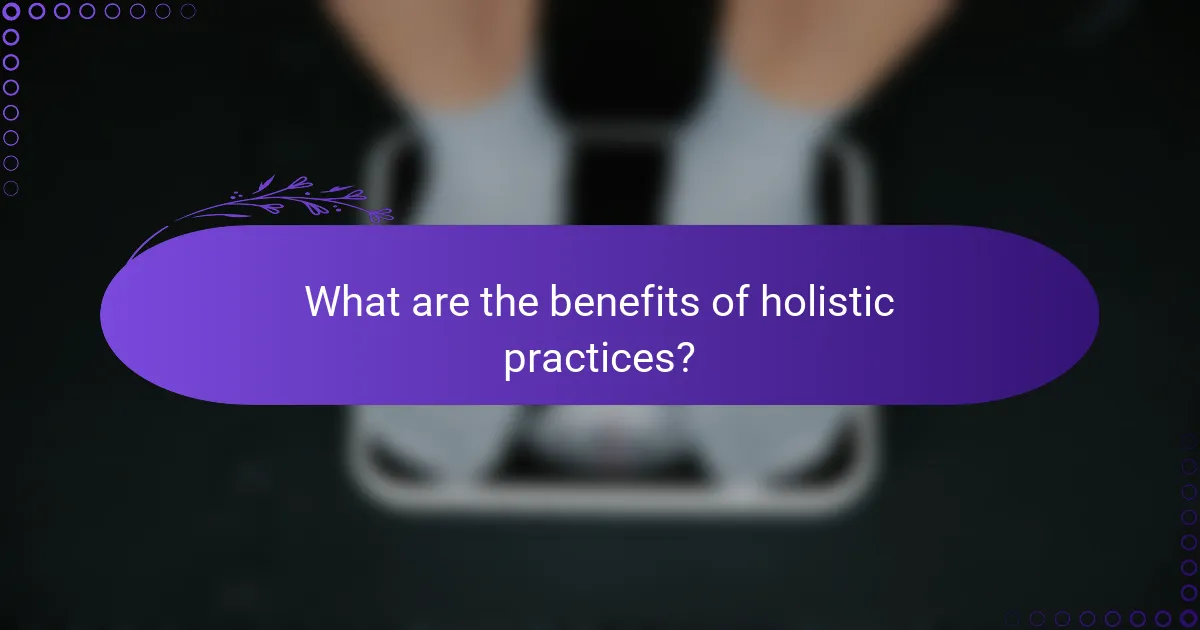
What are the benefits of holistic practices?
Holistic practices offer a comprehensive approach to health that considers the whole person—mind, body, and spirit. These methods aim to promote overall well-being rather than just treating specific symptoms, leading to more sustainable health outcomes.
Comprehensive health approach
A comprehensive health approach in holistic practices involves integrating various aspects of a person’s life, including physical, emotional, and social factors. This means practitioners often assess lifestyle choices, stress levels, and emotional health alongside physical symptoms.
For example, a holistic practitioner might recommend dietary changes, stress management techniques, and physical therapies to address a chronic condition. This multifaceted strategy can lead to improved health and a greater sense of balance in life.
Personalized treatment plans
Personalized treatment plans are a hallmark of holistic practices, as they cater to the unique needs and circumstances of each individual. Practitioners typically conduct thorough assessments to understand a person’s specific health challenges and goals.
These plans may include a combination of therapies such as acupuncture, herbal medicine, nutritional counseling, and mindfulness practices. By tailoring treatments to the individual, holistic practitioners can enhance the effectiveness of the care provided, leading to better health outcomes.
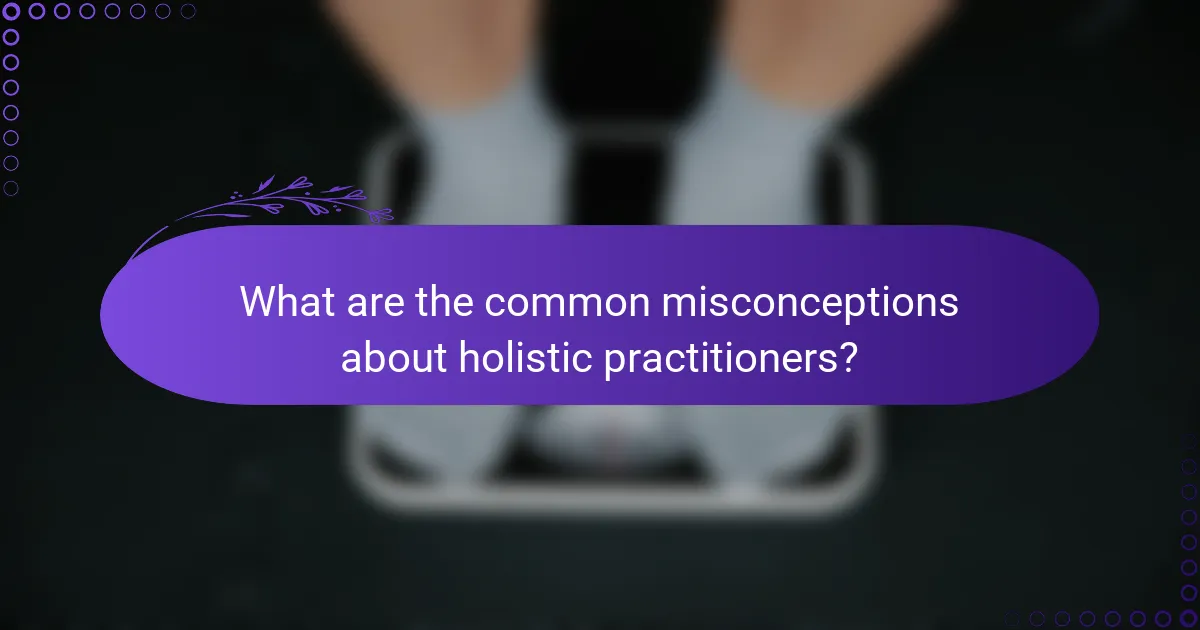
What are the common misconceptions about holistic practitioners?
Many misconceptions about holistic practitioners stem from a lack of understanding of their approaches and qualifications. Some people believe that holistic practitioners are unqualified or that their methods lack scientific backing, which can lead to skepticism about their effectiveness.
Holistic vs. conventional medicine
Holistic medicine focuses on treating the whole person—mind, body, and spirit—rather than just addressing specific symptoms. In contrast, conventional medicine often emphasizes diagnosing and treating individual ailments through medications and surgeries. While both approaches can be effective, they differ significantly in philosophy and methodology.
For example, a holistic practitioner might recommend lifestyle changes, nutritional adjustments, and stress management techniques alongside traditional treatments. This integrative approach can enhance overall well-being and promote healing in a more comprehensive manner.
Effectiveness of holistic treatments
The effectiveness of holistic treatments can vary widely based on the individual and the specific condition being addressed. Many people report positive outcomes from holistic therapies, particularly for chronic conditions, stress management, and mental health issues. However, scientific evidence supporting some holistic practices may be limited or anecdotal.
When considering holistic treatments, it’s essential to research and choose qualified practitioners who use evidence-based methods. Look for certifications and training in recognized holistic modalities, and always consult with your primary healthcare provider to ensure a coordinated approach to your health care.
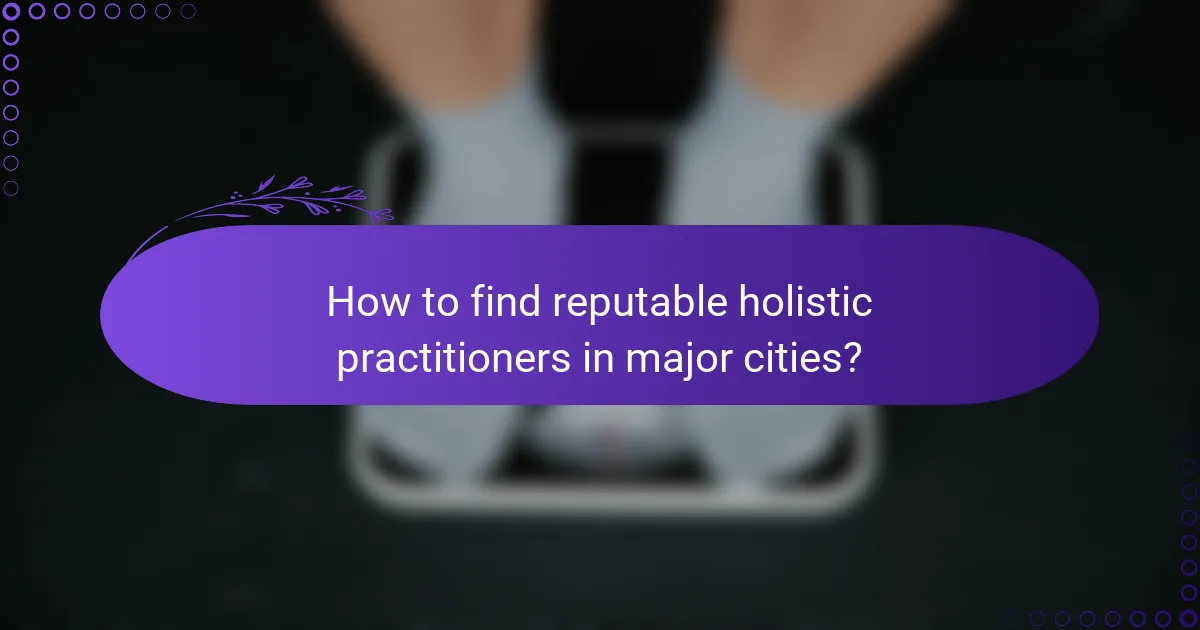
How to find reputable holistic practitioners in major cities?
To find reputable holistic practitioners in major cities, start by researching local directories and health-focused websites that list qualified professionals. Look for reviews and testimonials from previous clients to gauge their effectiveness and approach.
Qualifications to look for
When searching for holistic practitioners, check for relevant qualifications such as certifications in areas like acupuncture, naturopathy, or massage therapy. Many practitioners may also have degrees in complementary fields, which can enhance their expertise.
In the U.S., for instance, practitioners often need to be licensed or certified by recognized bodies, which ensures they meet specific educational and ethical standards. Always verify their credentials through official channels.
Specializations and services offered
Holistic practitioners often specialize in various areas, including nutrition, herbal medicine, energy healing, and mind-body therapies. Identifying your specific needs can help narrow down your options to those who offer the services you seek.
For example, if you’re interested in stress management, look for practitioners who specialize in mindfulness techniques or therapeutic massage. Many practitioners also provide a range of services, so inquire about their full offerings during your initial consultation.
Compatibility and personal rapport
Finding a holistic practitioner with whom you feel comfortable is crucial for effective treatment. Schedule an initial consultation to assess their communication style, approach, and whether they listen to your concerns.
Trust your instincts; a good rapport can significantly enhance your healing experience. Consider factors such as their availability, approach to treatment, and whether they respect your preferences and values.
